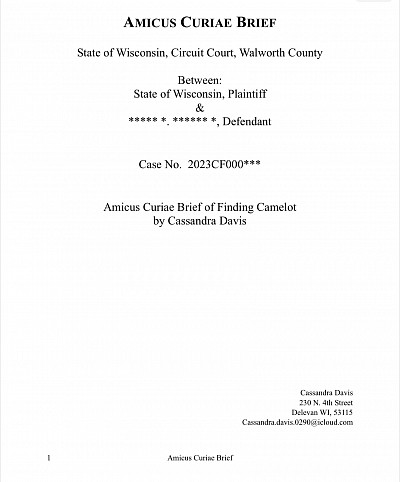Adventures in Advocacy
Championing Fairness for All
At Finding Camelot, we believe that liberty should not be reserved for the privileged. We are not legal professionals but through our Round Table Review, we have drafted amicus curiae briefs and other court documents intended to–
amplify the voices of the unheard and expose injustices
–in our legal system. Below are redacted versions of our legal filings—preserving privacy, upholding truth, and promoting transparency in all we do.
The Case Against Criminalizing Victimless Actions
This amicus brief argues that the prosecution of individuals for victimless actions violates fundamental constitutional rights, particularly liberty and privacy. It calls for judicial reform that aligns with both constitutional protections and evolving public values and
it critiques the expansion of criminal law into private domains where no harm is caused.
This brief draws attention to the harmful consequences of such criminalization, including mass incarceration, racial and socioeconomic disparities, and the expansion of the prison-for-profit system.
Interest of the Amicus Curiae
Organization: Finding Camelot
Mission: Enhance working-class quality of life
Key Arguments
- Challenges legal definitions that compromise individual liberty
- Critiques laws that define crimes based on potential punishment
- Emphasizes the need for laws aligned with constitutional protections
Constitutional Foundations of Liberty
- 14th Amendment Due Process Clause
Protects against arbitrary state actions and safeguards individual freedom
- 9th Amendment
Acknowledges unenumerated rights and prevents government overreach
Landmark Legal Precedents
- Griswold v. Connecticut (1965)
Established constitutional right to privacy
- Lawrence v. Texas (2003)
Struck down laws criminalizing private consensual conduct
- Robinson v. California (1962)
Ruled against criminalizing personal status/conditions
Statistical Evidence on Victimless Crimes
- Racial Disparities
Black individuals 3.64-4x more likely to be arrested for marijuana possession
- Socioeconomic Factors
Lower-income individuals more likely to be targeted
- Contribution to Mass Incarceration
16% of prison population incarcerated for drug offenses and perpetuates prison-for-profit system
Public Safety and Criminalization Inefficacies
- No significant increase in crime rates in states with decriminalization
- Diversion of law enforcement resources
- Erosion of community trust
- Perpetuation of cycles of poverty and violence
Recommendations
- Reevaluate laws criminalizing victimless actions
- Prioritize individual liberty
- Focus on harm prevention over punishment
- Align legal practices with constitutional principles
Key Takeaways about Victimless Crime Laws
- Infringe on constitutional rights
- Disproportionately affect marginalized communities
- Do not effectively improve public safety
- Drain judicial and law enforcement resources
Conclusion
A call for legal reform that respects individual freedoms, promotes social justice, and aligns with constitutional principles of liberty and equality.
Addressing Discrimination in Cash Bail Systems
This brief argues that the arrest and $5,000 cash bond imposed on a defendant for a nonviolent, victimless offense—following a potentially unlawful traffic stop—raise serious constitutional concerns. The stop may have violated the Americans with Disabilities Act (ADA) by targeting a vehicle registered to a physically disabled person without a license. The resulting detention fails to meet the constitutional standards of reasonable suspicion and due process, and represents a broader pattern of economic discrimination embedded in the cash bail system.
Interest of the Amicus Curiae
Organization: Finding Camelot
Mission: Enhance working-class quality of life
Key Arguments
1. Traffic Stop Concerns
- Initiated without reasonable suspicion
- Potentially discriminatory based on vehicle registration to a disabled person
- Violations of:
Americans with Disabilities Act and Fourth Amendment protections
2. Bail Setting Issues
- $5,000 cash bond for a nonviolent, victimless offense
- Violates constitutional principles of bail
- Disproportionately impacts economically disadvantaged individuals
Legal Foundations and Constitutional References
- Fourth Amendment: Protections against unreasonable searches and seizures
- Eighth Amendment: Protection against excessive bail
- Wisconsin Constitution, Article I, Section 8: Guarantee against excessive bail
- Stack v. Boyle (1951): Bail should be reasonably calculated to ensure trial appearance
- State v. Post (2007): Requirement for specific, articulable facts for detention
- State v. Taylor (2017): Consideration of defendant's ability to pay bail
Systemic Impacts Highlighted
- Over 400,000 individuals nationally detained pretrial
- Consequences of pretrial detention:
Economic hardship , potential coerced guilty pleas , and racial and economic disparities
Requested Remedies
- Reduce bond to recognizance or nominal amount
- Acknowledge constitutional concerns
- Consider broader systemic consequences of wealth-based detention
Conclusion
This brief argues that justice should not be withheld based on disability or economic status, emphasizing the need for an accessible and accountable legal system.
Fighting for Pro Se Rights
In April 2024, Finding Camelot drafted and submitted a Motion for Remedial Action on behalf of a self-represented defendant in Walworth County. At the defendant’s request, we stepped in to help articulate the challenges faced by pro se litigants—individuals who represent themselves in court—and to propose systemic reforms that would make justice more accessible for everyone.
What the Motion Argues
This motion confronts a hard truth: while citizens have a constitutional right to represent themselves, the legal system in Wisconsin makes it almost impossible to do so effectively. The document outlines major barriers that stand in the way:
- Gatekeeping through procedure: Prosecutors and court staff use complex procedural rules to overwhelm those without legal training.
- Monopoly on justice: Legal professionals benefit from exclusive access to user-friendly legal resources, while pro se litigants are forced to navigate scattered, technical documents.
- Informational inequality: The legal system expects self-represented defendants to perform like lawyers, without offering them the tools or guidance they need.
- Segregation by language: The use of “legalese” functions like linguistic segregation, barring ordinary people from understanding the rules that govern their lives.
Legal Foundations
The motion draws on a wide body of legal precedent and policy, including:
-
The Sixth Amendment and Faretta v. California (affirming the right to self-representation)
- Antitrust laws, used to highlight the monopolistic structure of legal knowledge
- Landmark civil rights cases like Brown v. Board of Education and Lau v. Nichols, to demonstrate how lack of access to information amounts to modern-day segregation
What Finding Camelot Proposes
The motion offers specific, actionable reforms that courts could implement immediately:
- A plain-language e-filing guide for self-represented litigants
- An online library of motion templates
- A step-by-step hearing guide to reduce confusion and anxiety
- A formal grievance process for those who encounter procedural barriers
Why This Matters
At Finding Camelot, we believe justice should not be reserved for those who can afford an attorney. This motion reflects our broader mission: to support liberty, dignity, and empowerment for everyday people—including in the courtroom.
By advocating for a more transparent and inclusive court system, we’re helping build the foundation for a legal future where justice truly is for all.


